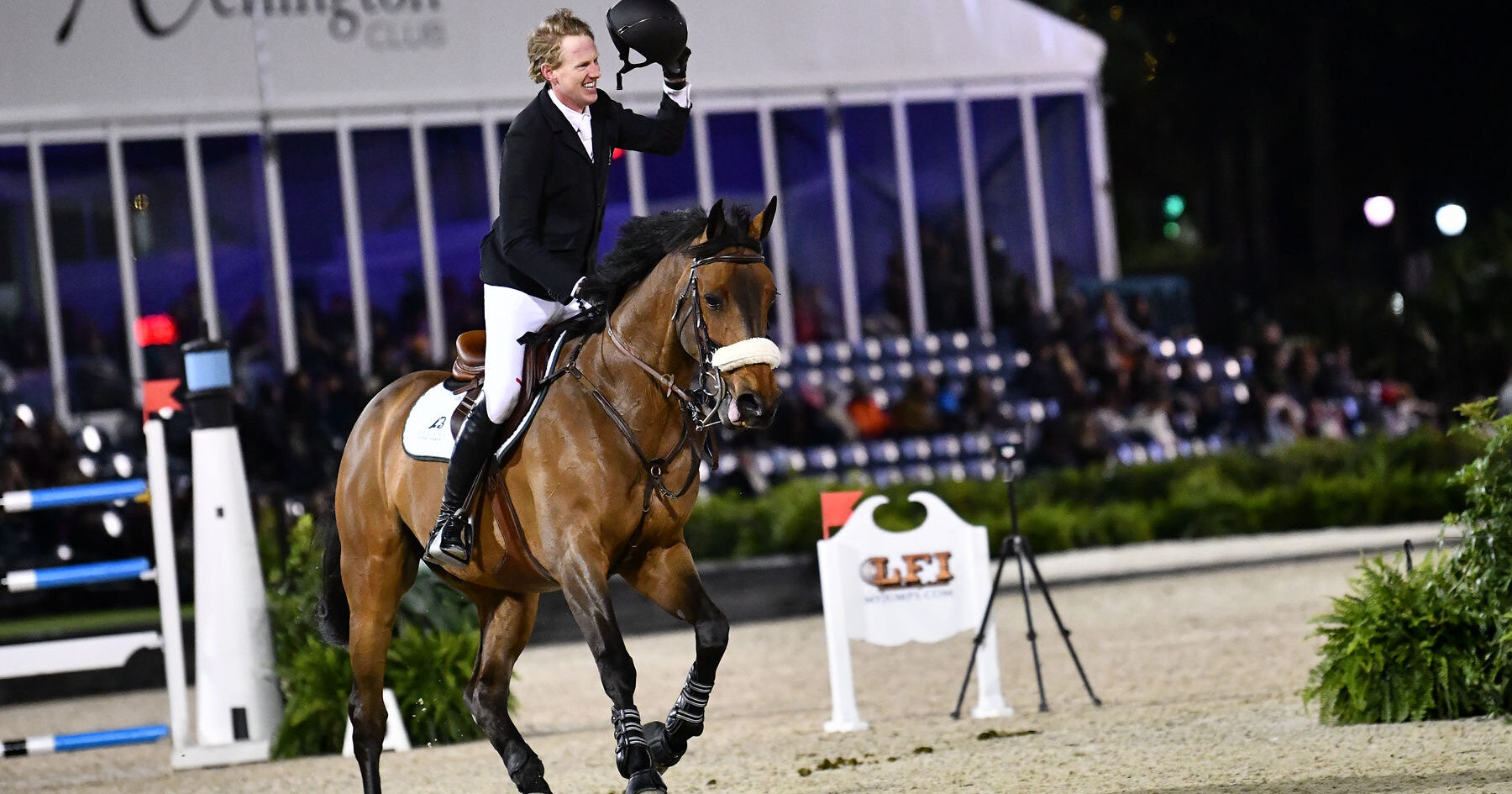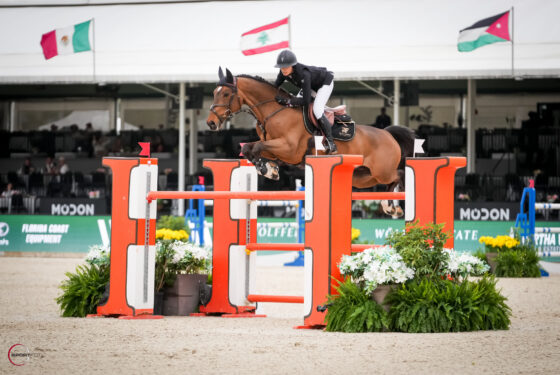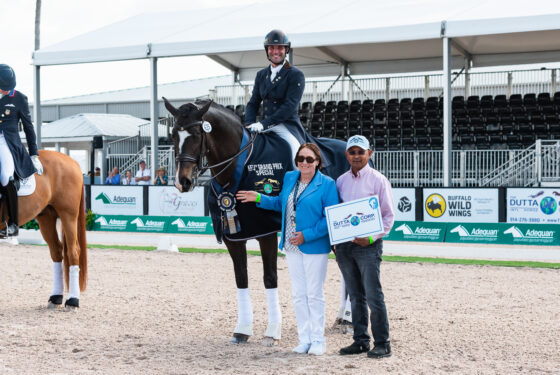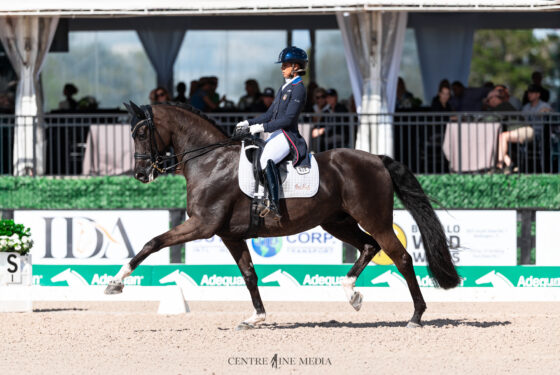Andrew Bourns, the founder of Bourns Sport Horses, Inc., started working with young horses in his teens. In $2,022, he achieved victories across the globe, including winning the Nations Cup for Ireland. Read on to learn about Bourns’equestrian beginnings, his passion for the sport, and his dedication to his business and students.
Born into a farming family in Ireland, Andrew Bourns started his equestrian journey working with young horses when he was a teenager. With the support of his family, he founded Bourns Sport Horses, Inc. in Lommel, Belgium, and Wellington, Florida.
In $2,022, Bourns achieved impressive victories across the globe, placing in the top ten of the WEF $2,022 Rolex CSI5* Grand Prix with Sea Topblue, winning the Nations Cup for Ireland at Thunderbird, and riding clear across five/star classes in Dublin and Hickstead.
Returning to Wellington this season, Bourns set his sights on success and placed second in the Holiday and Horses 4* Grand Prix in December. Bourns’admiration and dedication to the sport keep him showing up every day to be his best, not only for himself but also for his business and students.
Read the full article to discover how Andrew Bourns got his start in the equestrian industry, his love for Ireland, and much more!
Photo courtesy of Andrew Bourns. (C)Four Oaks Creative
How did you get into riding?
It’s a family affair for me. I would be third generation that’s recorded with horses, definitely second generation in horse sport. I come from a farming family, so we had cows and sheep at home in Ireland, and the horses were just a nice kind of segue. I mostly started competing ponies, which is a big deal in Ireland and in Europe in general. I was relatively successful in that; I won a silver medal at the European Championships in the 14.2 ponies. I was in the top five individually in Europe in the pony classes at some point, and that was followed by competing two times in the Junior European Championships and the Young Rider European Championships, always on horses that were owned by my family. Which is what I credit as my recipe for success. My family was always there for me, we built who we are today in this sport together and from the ground up.
What does a day of training look like for you?
I like to start early in the morning. I have created a routine that allows me to physically prepare myself before I get on a horse. When you start on horses like Sea Topblue, high caliber competition horses, there’s not much margin for error when you get on, so I can’t get on a little stiff or not properly fueled, because a horse like that shows up ready to go every single day and I have to do the same.
After some riding in the morning, I dedicate the late mornings to teaching my students and then I’ll ride again in the afternoon. Most of my competition horses are ridden twice a day during season. We also have some trials mixed in throughout the day. If I’m showing a horse, I like to flat them in the morning before they show, so I make sure I have time for that. Sometimes that means starting the day riding in the dark. I do this so that by the time they come to the ring, they’ve warmed up and are truly ready to enter the arena. It’s important, both for the optimization of their performance and to avoid injuries as well. No fighter shows up for a title fight having sat on the couch all day. It’s a process and it’s very refined, one that we’ve tried to perfect over the past couple of years to not only increase our horses’performance, but to also avoid injury. Our primary focus is the welfare of the horse – Keep them sound, happy and very, very healthy, both for my personal mounts and the sale horses.
Outside of riding and training, a part of my day that is extremely important is my physical fitness. I do Pilates quite a bit here in Wellington at Pilates Rocks, as well as the gym. Keeping up with my physical fitness on a daily basis has allowed me to be more effective in the saddle, as well as undoing some of the damage to my body that riding can naturally cause overtime. I do believe that without things like Pilates, I wouldn’t be where I am today, or maybe not even in the saddle at all.
Photo courtesy of Andrew Bourns. (C)Four Oaks Creative
You’ve been competing at the highest level of the sport for quite some time now. How do you continue learning new things?
I had a groom who was new to the sport who asked me once why I don’t train myself. It’s important to always have people who are better than you surrounding you and I’m not afraid to admit that. I’ve always had someone good on the ground watching me. Right now, it’s Chris Kappler, but there have been countless people throughout my career on the ground to help me. The sport itself is evolving at such a rate and the type of horses we’re using are evolving. I like to compare it to Formula One car racing because the Formula One cars are evolving the same way our horses are evolving. They’re becoming smarter, sharper, and much much quicker and more agile, even in the last 10 years. That’s why I always have someone on the ground with me when I ride to keep me learning and adjusting. I feel if you want to remain competitive in this sport, you have to keep up with it and that involves learning, and constantly self/assessing yourself.
Something that also keeps me motivated to do my best every day is the team around me, I couldn’t do any of it without them. My grooms have always been a huge part of my success, as well as my horses’success. I owe a lot of my success to Sarah Pyrda, who’s been traveling all over the world with Blue. I’ve also brought in Kerry McCahill on a professional level who’s been helping me to balance my sales business and teaching. It makes it easier to keep learning and work hard with a great team around you.
You’ve represented Ireland in the sport from the beginning, and now all the way up to winning Nations Cups. What is it like to represent your country with a group of riders that carries so much enthusiasm?
I think there’s something very special about riding for the Irish team. First of all, to get on an Irish team is a great honor because the Irish team has a huge range of amazing riders all over the world. For example, some weeks in Wellington, twenty to thirty Irish riders are declared in the FEI divisions. Some weeks, there’s almost more Irish riders than there are American riders here, at the highest level of the sport in the world. It’s an enormous achievement just to get on the Irish team because it means you’ve competed against some of the best riders in the world. There’s a great history and tradition with Ireland and the Nations Cup. When you’re on an Irish Nations Cup team, you’re expected to win, and I think Michael Blake has really brought that ethos to the team. It doesn’t matter if it’s a three/star in Portugal, a four/star here in Wellington, or a five/star in Langley or Aachen, we are there to win. I just find that hugely encouraging and enjoyable to show up with a team of riders all there for the same purpose. You’re there to jump clear rounds, you’re there to be the best.
Irish people in general are extremely proud of where they come from, as they should be, and that’s one of the best parts of being on the team. They say in Ireland, one of their best imports or exports are their people all over the world, and I think Wellington is the perfect example of that. Some of the most fantastic riders and the best people here are Irish, and we have a great community here in particular. We support and help each other to be successful, and a huge part of my personal success has been a direct result of the Irish community here. I think it’s important to acknowledge that.
Photo courtesy of Andrew Bourns. (C)Four Oaks Creative
What piqued your interest to start Bourns Sport Horses?
Bourns Sport Horses Inc. was born out of necessity. I really liked riding, but we only had field hunting horses and farm horses, and for me to get to the higher level of the sport, I had to find a way for it to make money. The best way we found to make money out of it was to buy younger horses, produce them, educate them, and then sell them to people who were ready to compete at a higher level. For me, my drive was always trying to be the best at it. If it was a 1.10m horse, I wanted it to be the nicest 1.10m horse in the world. My dad drove the truck and my mom was the groom. We did it all together and grew the business together. Because the business formed the way it did, the underlying principle of the business and our sports program always was, and is, the welfare of the horse and ensure they’re happy, healthy, and sound at all times. The better we are at that, the better we are at everything else.
What are the qualities that make Sea Topblue so special?
Well, first of all, we’ve had Sea Topblue since he was a foal, so he’s really part of the family. He’s as important to our family as I am, or my brother is or my dad. When we lost my mom last year, she made us promise that we would go as far as we could and do the best job we could. We were all always fiercely proud of him, even from when he was a four/ or five/year/old. I strongly believe that because he was raised with just such love and admiration, he never knew anything other than to be the best. Now, there’s no doubt he has a lot of traits that normal horses don’t have, and he’s extremely intelligent. He’s also extremely manipulative and he can make humans do things that normal horses can’t, he’ll stand there, and he’ll have you going off to get him a cookie before you know what’s happened.
He’s not just intelligent on a normal level for horses, he’s incredibly emotionally intelligent as well. He’s the kind of guy that knows if you’re having a bad day, he knows when something is important, when it’s not, when he can have fun, and when it’s time for business. About an hour or two before a big class, he goes into game face mode and the emotions go away. He gets extremely serious. He’s like a basketball player before a game. He just totally gets in the zone. He’ll hold his ears back a little bit, and all the cuddliness, all the emotions go out the window. No matter the condition he wants to win and go fast.
When he was second in the Holiday and Horses Grand Prix, my dad said to Eddie Macken afterwards, “if only he went a little faster,” and Eddie says, “what are you saying he spent the last five years trying to slow him down and now you want him to go faster?” It’s my job to contain his talent for the right moments because he will overkill. It’s very rare that you feel he’s hitting the max of his abilities. In the Nations Cup Final in Barcelona, the course was 1.60m from the first fence to the last and he was just cruising. He was just so at ease at that level which is very exciting.
Photo courtesy of Andrew Bourns. (C)Four Oaks Creative
What are your plans for the rest of WEF $2,023?
For Sea Top Blue, I’d like him just to hit each five star along the way. I have another horse this week called Menko VD Wellington, which I’m aiming to have as a support horse at the five/star level for Blue. He’s very competitive at the 1.50/1.55m level, he hasn’t hit the 1.60m level yet, but I think it won’t be long before he does. Maybe Manko could divert a little bit and do the Nations Cup or another four/star, but for now, he’ll stick to the five stars, and then I have some younger horses back home in Ireland, very exciting ones that I will bring back with me next winter when they’re ready.
What is a piece of advice that you carry with you?
The harder you work, the luckier you get. You know, fortune favors the prepared. I go into every situation, I’d like to think, ready for it, and that the horses are ready for the situation as well. I try not to over face my horses and over face myself until we’re ready. Another piece of advice is to work hard at home, so when you get to the show it feels easy. I instill this system in both my horses and my student’s programs to build confidence. The hard stuff should always happen at home, so once you walk into that ring you feel at your absolute best and like you can tackle anything.
Photo courtesy of Andrew Bourns. (C)Four Oaks Creative
Look out for Bourns in this Saturday’s Fidelity Investments (R) CSI5* Grand Prix!






